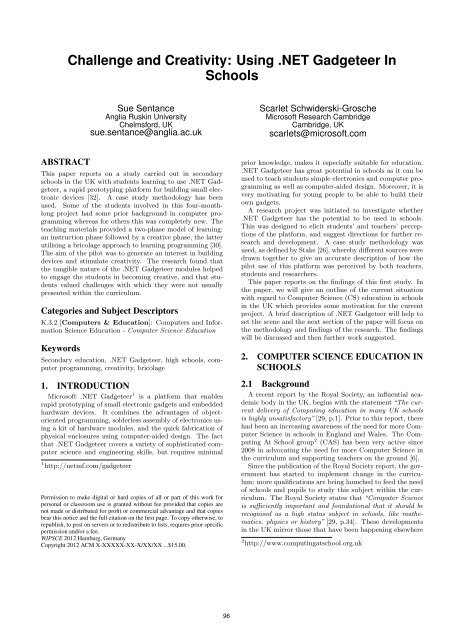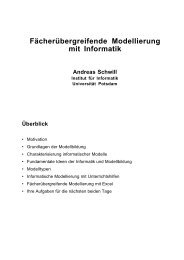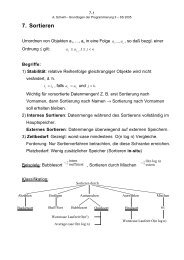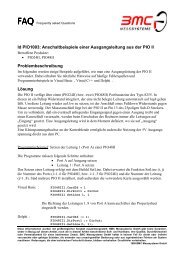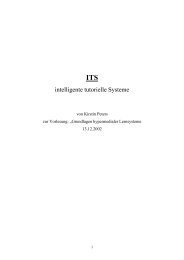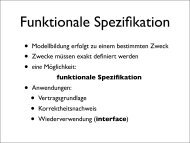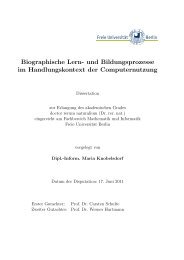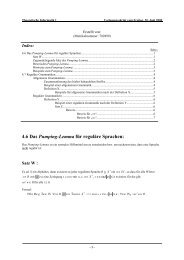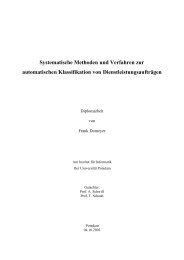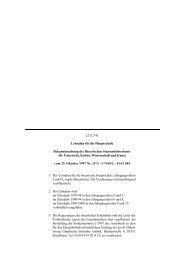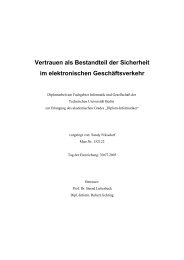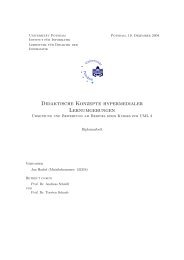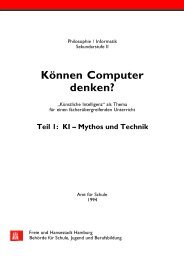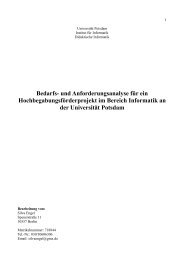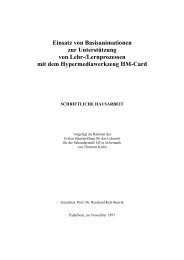Maria Knobelsdorf, University of Dortmund, Germany - Didaktik der ...
Maria Knobelsdorf, University of Dortmund, Germany - Didaktik der ...
Maria Knobelsdorf, University of Dortmund, Germany - Didaktik der ...
Create successful ePaper yourself
Turn your PDF publications into a flip-book with our unique Google optimized e-Paper software.
ABSTRACT<br />
Challenge and Creativity: Using .NET Gadgeteer In<br />
Schools<br />
Sue Sentance<br />
Anglia Ruskin <strong>University</strong><br />
Chelmsford, UK<br />
sue.sentance@anglia.ac.uk<br />
This paper reports on a study carried out in secondary<br />
schools in the UK with students learning to use .NET Gadgeteer,<br />
a rapid prototyping platform for building small electronic<br />
devices [32]. A case study methodology has been<br />
used. Some <strong>of</strong> the students involved in this four-monthlong<br />
project had some prior background in computer programming<br />
whereas for others this was completely new. The<br />
teaching materials provided a two-phase model <strong>of</strong> learning:<br />
an instruction phase followed by a creative phase, the latter<br />
utilising a bricolage approach to learning programming [30].<br />
The aim <strong>of</strong> the pilot was to generate an interest in building<br />
devices and stimulate creativity. The research found that<br />
the tangible nature <strong>of</strong> the .NET Gadgeteer modules helped<br />
to engage the students in becoming creative, and that students<br />
valued challenges with which they were not usually<br />
presented within the curriculum.<br />
Categories and Subject Descriptors<br />
K.3.2 [Computers & Education]: Computers and Information<br />
Science Education - Computer Science Education<br />
Keywords<br />
Secondary education, .NET Gadgeteer, high schools, computer<br />
programming, creativity, bricolage<br />
1. INTRODUCTION<br />
Micros<strong>of</strong>t .NET Gadgeteer 1 is a platform that enables<br />
rapid prototyping <strong>of</strong> small electronic gadgets and embedded<br />
hardware devices. It combines the advantages <strong>of</strong> objectoriented<br />
programming, sol<strong>der</strong>less assembly <strong>of</strong> electronics using<br />
a kit <strong>of</strong> hardware modules, and the quick fabrication <strong>of</strong><br />
physical enclosures using computer-aided design. The fact<br />
that .NET Gadgeteer covers a variety <strong>of</strong> sophisticated computer<br />
science and engineering skills, but requires minimal<br />
1 http://netmf.com/gadgeteer<br />
Permission to make digital or hard copies <strong>of</strong> all or part <strong>of</strong> this work for<br />
personal or classroom use is granted without fee provided that copies are<br />
not made or distributed for pr<strong>of</strong>it or commercial advantage and that copies<br />
bear this notice and the full citation on the first page. To copy otherwise, to<br />
republish, to post on servers or to redistribute to lists, requires prior specific<br />
permission and/or a fee.<br />
WIPSCE 2012 Hamburg, <strong>Germany</strong><br />
Copyright 2012 ACM X-XXXXX-XX-X/XX/XX ...$15.00.<br />
96<br />
Scarlet Schwi<strong>der</strong>ski-Grosche<br />
Micros<strong>of</strong>t Research Cambridge<br />
Cambridge, UK<br />
scarlets@micros<strong>of</strong>t.com<br />
prior knowledge, makes it especially suitable for education.<br />
.NET Gadgeteer has great potential in schools as it can be<br />
used to teach students simple electronics and computer programming<br />
as well as computer-aided design. Moreover, it is<br />
very motivating for young people to be able to build their<br />
own gadgets.<br />
A research project was initiated to investigate whether<br />
.NET Gadgeteer has the potential to be used in schools.<br />
This was designed to elicit students’ and teachers’ perceptions<br />
<strong>of</strong> the platform, and suggest directions for further research<br />
and development. A case study methodology was<br />
used, as defined by Stake [26], whereby different sources were<br />
drawn together to give an accurate description <strong>of</strong> how the<br />
pilot use <strong>of</strong> this platform was perceived by both teachers,<br />
students and researchers.<br />
This paper reports on the findings <strong>of</strong> this first study. In<br />
the paper, we will give an outline <strong>of</strong> the current situation<br />
with regard to Computer Science (CS) education in schools<br />
in the UK which provides some motivation for the current<br />
project. A brief description <strong>of</strong> .NET Gadgeteer will help to<br />
set the scene and the next section <strong>of</strong> the paper will focus on<br />
the methodology and findings <strong>of</strong> the research. The findings<br />
will be discussed and then further work suggested.<br />
2. COMPUTER SCIENCE EDUCATION IN<br />
SCHOOLS<br />
2.1 Background<br />
A recent report by the Royal Society, an influential academic<br />
body in the UK, begins with the statement “The current<br />
delivery <strong>of</strong> Computing education in many UK schools<br />
is highly unsatisfactory” [29, p.1]. Prior to this report, there<br />
had been an increasing awareness <strong>of</strong> the need for more Computer<br />
Science in schools in England and Wales. The Computing<br />
At School group 2 (CAS) has been very active since<br />
2008 in advocating the need for more Computer Science in<br />
the curriculum and supporting teachers on the ground [6].<br />
Since the publication <strong>of</strong> the Royal Society report, the government<br />
has started to implement change in the curriculum;<br />
more qualifications are being launched to feed the need<br />
<strong>of</strong> schools and pupils to study this subject within the curriculum.<br />
The Royal Society states that “Computer Science<br />
is sufficiently important and foundational that it should be<br />
recognised as a high status subject in schools, like mathematics,<br />
physics or history” [29, p.34]. These developments<br />
in the UK mirror those that have been happening elsewhere<br />
2 http://www.computingatschool.org.uk


